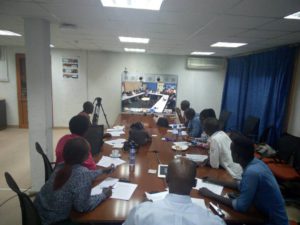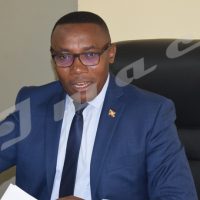The bi-annual analysis of the African economy conducted by the World Bank shows the economic growth in Sub-Saharan Africa is recovering at a modest pace and is projected to pick up to 2.4% in 2017 from 1.3% in 2016.

Burundian journalists followed the video press conference organized by the World Bank
According to the 16th edition of the Africa’s Pulse, there are some factors that contributed to the economic growth, notably the rebound of the investment growth and the increase in capital assets.
“There was also renewal of confidence of investors in Africa”, says Albert Zeufack, World Bank Chief Economist for Africa. He also says South Africa and Nigeria contributed to 50% of the GDP in Africa.
He, however, says most countries do not have significant wiggle room when it comes to having enough fiscal space to cope with the economic volatility. “It is imperative that countries adopt appropriate fiscal policies and structural measures now to strengthen economic resilience, boost productivity, increase investment, and promote economic diversification,” he says.
The World Bank analysis has shown that rising capital accumulation has been accompanied by falling efficiency of investment spending in countries where economic growth has been less resilient to exogenous shocks.
Albert Zeufack says the economic growth in Burundi like other countries with fragile economy has been affected by the political instability. He says Burundi is going through a period of instability that is slowing down economic growth and weak performance due to the reduction of raw materials and internal political uncertainty or political uncertainty itself. “This creates uncertainty about investment and slows down growth”, he says.
The World Bank expert says it is important for countries to take the right policies to diversify the economy but also ensure that there is a good institutional policy.
The World Bank report reveals that the Sub-Saharan Africa is projected to see a moderate increase in economic activity, with growth rising to 3.2% in 2018 and 3.5% in 2019. The commodity prices firm and domestic demand gradually gains ground, helped by slowing inflation and monetary policy easing.



















 IWACU Open Data
IWACU Open Data

